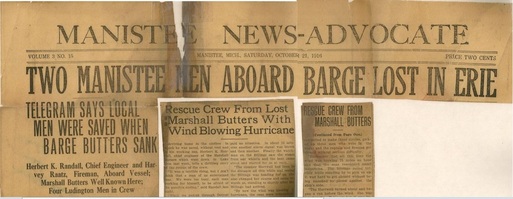Arriving home in the clothes in which he was saved, without vest and in his working cap, Herbert K. Randall, chief engineer of the Marshall Butters which went down in Lake Erie last week, tells a thrilling story of the rescue of the crew.
"It was a terrible thing, but I don't think that a man of us entertained fear. We were too busy, each man working for himself, to be afraid of the possible ending." said Randall last night.
"When we passed through Detroit there was a fresh southeast wind blowing, but not strong enough to detain us any until we had passed the southeast shoal by about 45 minutes. It was at 12:30 Friday afternoon that the squall struck us. We were six or eight miles from the shoal light at the time. When it was first noticed that a storm was coming the captain came aft and asked us to work her up stronger. This took us about 20 minutes. Heavy seas began to roll about this time and we noticed that the ship was leaking, taking in water fast.
"I understood what this meant and went forward and asked Capt. McClure to put her into the sea or before it. Instead of doing this Capt. McClure put her in the trough, in an attempt to throw her deck load off and lighten her. We were loaded with lath and a small amount of lumber above decks and had we been successful in getting rid of this load we might have ridden the gale longer. As it was she would not throw and we ran in the trough for a few minutes longer, watching the water meanwhile. We had the pumps going but the water kept gaining on us steadily and I again reported to the captain.
"We had seen the steamer Billings about five miles to leeward and Capt. McClure blew the alarm signal. They apparently did not hear us, for they paid no attention. In about 15 minutes another alarm signal was blown and then another. Finally the watchman on the Billings saw the steam from our whistle and the boat came about and started for us at once.
"The steamer Hartwell had been in the distance all this while and seeing the Billings was heading for us, she also changed her course and came towards us, standing to shortly after the Billings had arrived.
"By now the wind was blowing a hurricane, the seas were tremendous and our deck load was going by the board. Heavy pieces of planking were lifted off the deck and sent hurling through the air. Pieces of boards and shingles caught in the whistle, causing it to blow continually. It was a horrible sound and when I could stand it no longer, I risked my life and climbed up to where I could cut the cord.
"About this time we got the starboard boat launched and eight of the crew, including myself, got in and cast off. The captain of the Hartwell hollered, "Come on with your boat," and we headed for the steamer. It was a terrific pull to get to her. The seas were rolling higher than the house tops - the wind so strong that you had to yell to a man only a few feet away to make him hear you.
"After about 20 minutes we were able to get aboard the Hartwell. Looking back to the Butters we could see the rest of the crew, five men, standing on her deck. I guess we all lost our nerve then. It was awful to see them standing there helpless.
"It was just one-half hour after this that the Butters broke up and went down. A few minutes before she went under the captain and one fireman took to the yawl and the other three jumped into the water.
"The steamer Billings after being compelled to make three circles, picked up three men who were in the water and the captain and fireman got aboard without serious difficulty.
"Remember that all this time the wind ws blowing 75 miles an hour and that the seas resembled small mountains. The Billings rolled terribly while standing by to pick us up. It was hard to get aboard without being smashed to pieces against the ship's side.
"The Hartwell turned about and began a run before the wind. She was consigned to Fairport, but it was impossible to make the harbor and she went on to Erie. She turned here and went into the wind. It was 5:30 Saturday afternoon when we finally made the Fairport harbor.
"We had all lost everything we had but were mighty glad to get in as we were."

 RSS Feed
RSS Feed